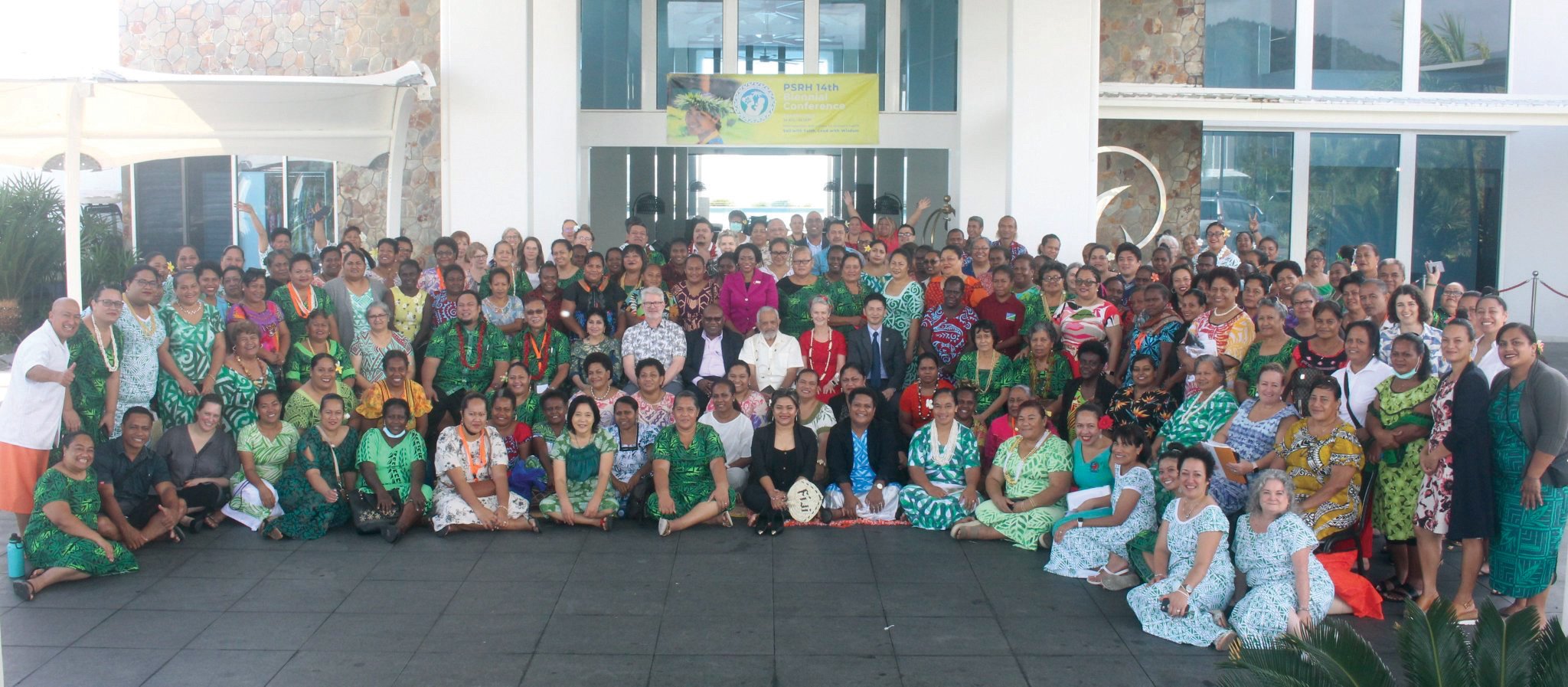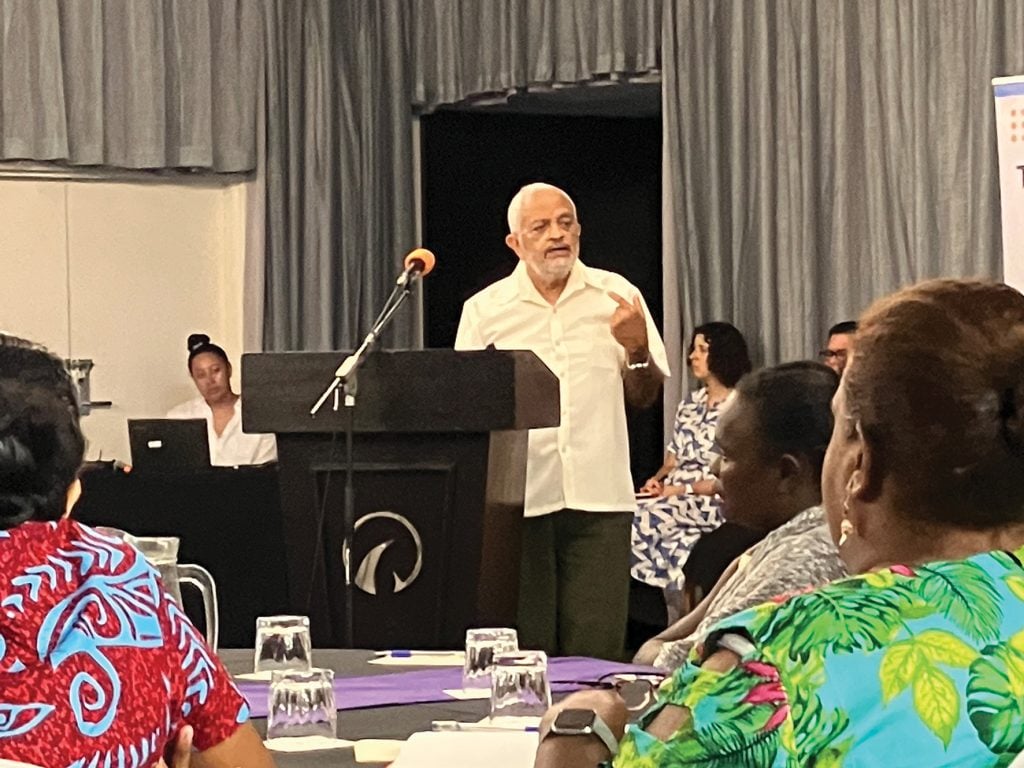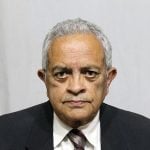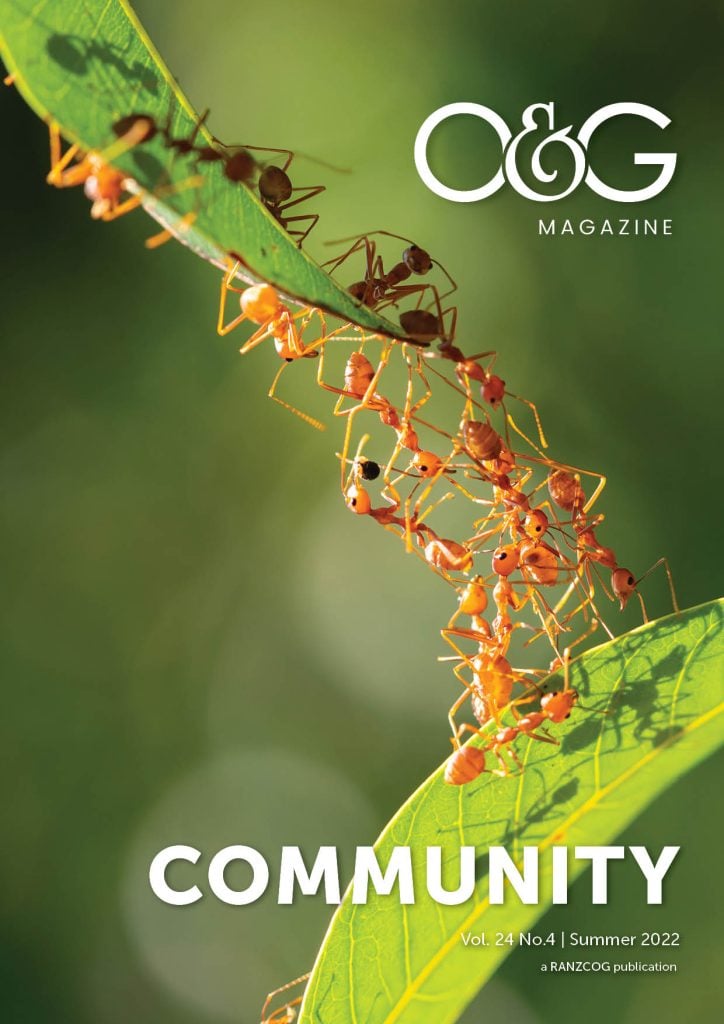This is the full version of the Brian Spurrett Oration delivered at the Pacific Society for Reproductive Health (PSRH) 14th Biennial Conference held in Apia, Samoa from 30 August to 2 September 2022.
The President of PSRH, the members of the Executive Board, the President of RANZCOG, representatives of UNFPA and SPC, Drs Fidow and Ah Ching and the Local Organising Committee, friends and colleagues from across the Pacific. Indeed, PSRH has brought us together for the 14th time and yes, the vision has become a reality.
I am grateful for being invited to present this Oration and would like to thank the President of RANZCOG for his flattering words of introduction. The RANZCOG Women’s Health Foundation supports the Brian Spurrett Oration. My sincere thanks for their support for this Oration.
This morning I want to share my thoughts on how Brian’s vision has become a reality.
Brian Spurrett, like you and I, chose women’s health for a career. He and his wife, Kerry, shared a passion for serving others, especially in women’s health. Sadly, she has not been able to join us at this conference. I think she has attended the preceding 13 Biennial Conferences. We remember her fondly and wish her the very best Pacific greetings.
Brian succeeded because he had a vision. He shared his vision with others and lobbied for support amongst his RANZCOG colleagues. He convinced them that reaching out into the Pacific was a natural extension of RANZCOG’s mission to provide quality health care for women.
Brian was a clinician, researcher, teacher and administrator. He was busy. But at the same time, he saw that collegiality was important. He became active in RANZCOG affairs first at a local level then at a state level, then at a national level and finally at the international level. He rose to the position of Senior Vice-President, and some of us would say should have become President. He was able to share his passion for working in developing countries with key collaborators in the College Council and thus began PSRH, which was the result of RANZCOG promoting professional networking in the Pacific at a small workshop in Suva in 1993. At the end of a very stimulating two days of clinical story telling and exchange of ideas, a working group of Pacific specialists was set up under the chairmanship of Wame Baravilala to form the predecessor of PSRH, called SPROGS, or South Pacific Regional O&G Society. The change in name in Apia in 1995 was in recognition of the new organisation’s acknowledgement that PSRH must include all health professionals engaged in reproductive health, thus the Pacific Society for Reproductive Health.
I would like to share some thoughts on the values which drove Brian.
Not unreasonably, security is a strong consideration for all of us. Security requires enough money to cover our needs and recognition of our professional efforts. However, in addition there is our love, commitment and compassion. These are priceless components of fulfilment. In the end we all aspire for peace, contentment and inner joy.
Our individual needs are great, but these should not confine us to our small, self-centred selves. Selflessness frees us to express our generosity, compassion and love. Selflessness is best expressed in service. Brian was selfless. He cared for those around and beyond him, and served them.
Brian was happy and content, even though his life was sadly shortened just as he was at the very height of his already distinguished career. I visited him the night before his death. He was at peace. I asked him if there was any unfinished business. He said to me, “the Young Gynaecologist Program needs to be developed further” and we talked about professional networking being important in lifting the quality of women’s health in the Pacific. PSRH is unique. It brings midwives and obstetricians together as equals. It values teamwork and team spirit. As for young gynaecologists, we will later at this conference be recognising Dr Nanise Sikiti, the first Pacific gynae-oncologist trained through a rigorous program designed by the International Society of Gynae Oncologists and supported by PSRH and its partners. Nani was a Young Gynaecologist Awardee (YGA) of AOFOG. Her paper on cervical cancer received the best presentation award against stiff competition from YGAs from several other countries of the Asia-Pacific region. She then was funded by AOFOG to present at FIGO in Vancouver.
Brian died in the year 2000. He became ill soon after the Apia PSRH meeting in 1997 and could not attend the Suva PSRH meeting in 1999. This meeting also brings back some sad memories. Chris Kohlenberg, a member of the RANZCOG Council, was returning home after running a pre-conference workshop on ultrasound in Suva. He died in a plane crash between Suva and Nadi. At this conference we have had the advantage of 7 pre-conference workshops facilitated by professionals with international credentials.
Brian Spurrett and Chris Kohlenberg have made lasting contributions to women’s health in the Pacific. We honour them and remember them with fondness. Our gratitude to them remains as strong today as it was when they were with us.
We should ask ourselves how we too can make a lasting contribution in our chosen profession in women’s health. I would argue that we improve our chances of doing this through collegiality, partnerships and commitment to quality.
The Sustainable Development Goals (SDGs), which followed the Millennium Development Goals (MDGs), lays emphasis on Partnerships for the Goals in its 17th and last goal. Without partnership we limit our impact. Partnerships are all about having a shared vision, collaboration, sharing resources, building capacity and efficiencies. Alone we may not succeed but together we can move mountains. Our combined efforts are essential. To work together we need to talk together with an open heart and a shared vision. To work together we need to find ways to combine our strengths in tackling the challenges we face in delivering our vision.

2022 PSRH Conference delegates and special guests
This PSRH meeting has brought us all together and let us see how we can work together to address the most significant challenges our region faces in delivering quality women’s health care. We are joined by RANZCOG, which is committed to quality care in women’s health; by UNFPA who are the champions of sexual reproductive health (SRH); and by SPC with its long history in the Pacific development agenda. There are other partners such as Ministries of Health, the training institutions, IGCS, Counties Manukau, RACS, RCOG and others such as Liverpool and Nepean Hospitals in Sydney, and Middlemore Hospital in Auckland, who have all contributed to the PSRH agenda to mobilise professional networking to empower our Pacific SRH workforce.
At the first Brian Spurrett Oration in Madang in 2001, I spoke on safe motherhood. The emphasis then was to make every pregnancy safe. This of course will always remain vital in women’s reproductive health.
Each of the seven pre-conference workshops this week is about improving the quality of care. Human reproduction is a key part of living. To enjoy our full human potential, we must be free from the burdens and complications associated with our reproductive function. We share the UNFPA vision of “delivering a world where every pregnancy is wanted, every childbirth is safe and every young person’s potential is fulfilled.” Our focus should remain on this vision of choice and the full enjoyment of our sexuality without fear, and at the same time being empowered to avoid sickness and disease due to our reproductive function. However, on this occasion I wish to address an emerging challenge which could paralyse our efforts in improving women’s health.
As I was preparing for this Oration, I came across a recent article by authors affiliated with the University of Technology Sydney (UTS) where the WHO Collaborating Centre for Nursing, Midwifery and Health Development is based. Two previous Brian Spurrett Orators, Professors Caroline Homer and Pat Brodie, were amongst the faculty responsible for the establishment of this Collaborating Centre. In their article entitled “Sustain and Retain Health Workforce”, Buchan et al note that 1 in 5 physicians and even more nurses are resigning post-COVID. Between 2019–2021 there were 27.9 million nurses worldwide, with a shortfall of 5.9 million.
I do not have recent local human resource figures, but I fear our problem in the Pacific could be worse. In the small health centre near me in Fiji, 3 of our 4 nurses recently resigned to go to New Zealand as carers. Yesterday morning on our walk, we met some senior health officials here in Samoa. They noted that Samoa has a shortage of some 500 nurses.
A recent virtual 14th Pacific Health Ministers Conference hosted by Tuvalu and supported by SPC and WHO earlier this year noted:
- The heath workforce is strained
- The infrastructure is inadequate
- The health budget constrained
- The burden of non-communicable diseases (NCDs) is severe
- The health-seeking behaviour in the community is problematic.
Amongst several resolutions put forth by the Health Ministers, one was to consolidate resources and integrate services.
For those of us in reproductive, maternal, neonatal, child and adolescent health, we need to find ways in which we integrate our services with NCDs which are responsible for the biggest burden of disease in the Pacific. We do not have the resources to be siloed into our individual specialities. We need to focus on the individual patient’s needs with an approach to wellness that extends from the womb to the tomb. Our focus must not be merely disease oriented. Empowering the community and the individual to avoid health risk-taking behaviour is essential, screening for at-risk individuals is good strategy, and providing targeted, quality care with best practice ensures we protect our patients from undue complications caused by poor care.
The NCD burden is huge on SRH, and vice versa. For example, fetal growth restriction is associated with subsequent insulin resistance. Obesity, diabetes and hypertension have huge impact on reproduction and reproductive organ disease.
I would now like to move onto the issue of sustaining and retaining our health workforce. However, to address the issue of dissatisfaction amongst our health care colleagues we need to address the issue of a happier workplace which is free from bullying and harassment, and where there is transparency in HR processes. RANZCOG and RACS have recently addressed some of these issues. PSRH may consider similar initiatives in the Pacific. The Clinical Quality Improvement Program identified by the 14th Pacific Ministers of Health could build into it staff support strategies including efforts to ‘Care for the Carer’.
It probably is important to note that after the first Pacific Health Ministers meeting in Fiji in 1995, the Yanuca Healthy Islands Declaration was made. As a consequence, DFAT commissioned RACS and Professor Gordon Clunie to develop a medical postgraduate program at the Fiji School of Medicine. Wame Baravilala was the Dean when the Masters program began. Many of you present here are beneficiaries of this program.
And finally on this issue, SPC has hosted the DFAT Pacific Clinical Services Program since 2017. One component of the program is to support Pacific clinical organisations such as PSRH. Here is an opportunity for the PSRH Board, SPC and RANZCOG to collaborate on sustaining and retaining the health workforce. SPC supported the South Pacific Chiefs of Nursing and Midwifery virtual meeting in 2021. The UTS WHO Collaborating Centre would be a key partner.

Emeritus Prof Rajat Gyaneshwar delivering the Brian Spurrett Oration at the 2022 PSRH Conference in Samoa
I want to move onto the partnership between PSRH, RANZCOG and UNFPA. In 1993, 25 of us met in Suva in a meeting organised by RANZCOG and funded by DFAT. At the conclusion of the meeting, Wame Baravilala was appointed as the Chair of the Steering Committee to form PSRH’s predecessor, SPROGS. UNFPA was persuaded to fund the first secretariat for this organisation. This relationship has continued over the years, but perhaps needs to be revisited to customise it to the current needs.
That vision of 1991, and careful strategic thinking and commitment, has led PSRH to bring us all together for this 14th Biennial meeting. What an amazing achievement, that all of us can be proud of. In the last three decades, RANZCOG has awarded Associate Membership to 65 Pacific Specialists in O&G. This recognition has been a morale booster for our colleagues.
The vision of PSRH was also to empower midwives and nurses as equal partners in reproductive health. Overall, 107 Brian Spurrett Fellowships and Pacific Midwifery Program Fellowships have been awarded. RACS, in collaboration with RANZCOG and PSRH, has conducted several in-country professional development workshops on intrapartum care and clinical decision making. RANZCOG has provided faculty support to FNU and UPNG to strengthen their undergraduate and postgraduate programs in O&G. Training programs have been developed in managing emergencies in obstetrics, in ultrasound scanning, and in coloscopy. Fellowships have been granted for postgraduate trainees to attend pre-exam courses, and several scholarships have been awarded to attend the Anatomy of Complications Workshops. PSRH has encouraged and made it possible for several of us to travel and network with each other since its inception in 1993.
I want to move onto the Pacific Midwifery Leadership Program. I would like to acknowledge Carmel Walker for this program. This is a 7-week program especially designed for the Pacific midwife or nurse for their professional development, including leadership skills, improving clinical practice, improving clinical supervision, and role modelling professionalism and respectful maternity care. Professor Caroline Homer has been a significant contributor in the development of research skills amongst the midwives.
In 2017 at the Vila PSRH meeting, Carmel Walker and then-President of PSRH, Kathy Gapirongo, a midwife from the Solomons, reported that 71% of the program participants had achieved promotion to higher roles; their job satisfaction had improved, as had their leadership skills and clinical practice.
Carmel was someone who was always looking for opportunities to push the RANZCOG Pacific agenda forwards. Carmel was a key driver of the PSRH success.
PSRH and its Board can be proud of a distinguished set of achievements. It gives us a sense of community. The opportunities for networking have been amazing. Enshrined in the constitution are processes to ensure that the PSRH administrative processes are robust and transparent. Being members of the Trust Board carries legal responsibilities. No doubt all the members of the Board understand this.
The members of the PSRH Executive and Board have been elected because they are seen as leaders. As leaders they must share the administrative load of the organisation. Sadly, the track record is poor. I am sure the new Board will address this. Perhaps an orientation workshop for the Board will help. I understand RANZCOG has some expertise in this. But all organisations need grass root support from their membership. The Biennial Conference should not remain an opportunity without some contribution from the participants. Attending PSRH biennial meetings should not be seen as a free ride. Participants need to show their commitment by active participation. The new Board might wish to address this.
Finally, I want to recognise the contributions of people like Brian Spurrett, Roger Gabb, Jeremy Oats, Carmel Walker, Wame Baravilala, Glen Mola, John Ah Ching, Rufina Latu, John Wilson, Peter Stone, Roy Watson, Chris Kohlenberg, Caroline Homer and more recently Ai Ling Tan. Alec Ekeroma was the major catalyst during the period of PSRH’s growth. His achievements since we first met in 1988 have been absolutely amazing. As for Karaponi Okesene-Gafa, she has a blend of Pacific genes which will ensure that PSRH’s development remains in good hands.
PSRH has once again brought us all together. For it to be sustained we need to do our share in supporting our leaders. Brian my friend, your vision has been realised, and with the efforts of those charged with ongoing responsibility, it will continue. Thankyou my friend for bringing us together for the 14th time.
Emeritus Professor Rajat Gyaneshwar delivered the Brian Spurrett Oration with support from the RANZCOG Women’s Health Foundation.






Leave a Reply